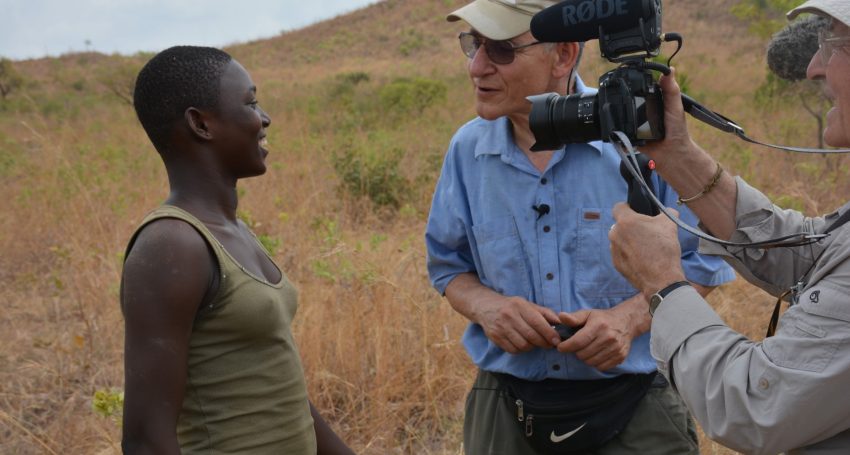The Forest Maker
Films & TV
“The Forest Maker is a superb documentary well worth watching — a film about the positive legacy of faith and justice that draws the viewer into the struggle to enable local Africans to reclaim the land that is a part of their spiritual identity,” says Jonathan Sargeant from St Francis College

In ministry circles there’s a standard line that goes around — with the difficulty of measuring effectiveness of ministry efforts, participants are often heard saying, “Well, we’re just planting seeds, who knows what good will come of this one day?”
It’s this line that comes to fruition in The Forest Maker, Volker Schlöndorff’s new documentary about reforestation in Africa.
Whilst that metaphor might seem apt, The Forest Maker isn’t primarily about reforestation. Well, not mostly. Schlöndorff follows a return visit by Australian Anglican agronomist Tony Rinaudo AM to Niger, a country where he spent 30 or so years.
Over that period, the eco-botanist, horrified by the extent of the encroaching desert, worked with local people to restore what he called the “Underground Forest”. This is the network of underground root systems that survived after the surface was devastated by aggressive farming and the ensuing cycle of drought, land clearing and population growth. As he travelled back in the day, his gentle message and methods, his desire to favour collaboration over colonial enforcement and his ever-present optimism and enthusiasm gradually succeeded.
This film follows Rinaudo’s return to Niger to visit former friends and allies and to see whether the efforts of the extraordinary coalition of local people were successful. It’s worth noting that the original mission coincided with wider efforts in Africa that became known as the “Great Green Wall” of the Sahara and the Sahel. This project, drawing together other endeavours, focused on a mission to plant a wide belt of trees across the widest part of Africa to combat desertification. Largely, this project featured tree planting, in contrast with Rinaudo’s root revival strategy.
Advertisement
With that background established, it’s delightful to see the way Tony Rinaudo is welcomed back into villages and communities with open arms and wider smiles. You detect the nature of the working relationship he had with the Indigenous people — good humour combined with hard graft that resulted in deep respect. To see Rinaudo laughing with locals in their own languages is wonderful and underscores more positive ways people from different backgrounds can come together to challenge what may seem like insurmountable odds.
In highlighting the stories of so many of the local population working to regenerate their forests, the film avoids the “white saviour” trope. Tony has been a catalyst in this process, but it only through continuing local efforts that the forests are returning. And returning they are. Widespread drone-led surveys of the areas show the extent to which Rinaudo’s efforts, in concert with the meticulous attention of local farmers and conservationists, have produced stunning results. With the return of the tree systems, soil has revived, water has returned, and flourishing life is coming back.
Advertisement
Over the course of the documentary Schlöndorff highlights the stories of local people and, in particular, the women of some communities become vibrant lead characters, challenging the patriarchal view some Westerners might have of these societies to nuanced effect.
It is worth noting that Schlöndorff’s career as a filmmaker is long, featuring many German productions such as 1979’s amazing The Tin Drum and some better known in the West like the original The Handmaid’s Tale in 1990. He brings a careful eye to proceedings and features himself during some interviews with Nigerian villagers. He skilfully weaves animated passages with interviews and fly-on-the-wall footage to engage the viewer. Schlöndorff’s expertise ensures that every voice is heard, providing a holistic perspective on the restoration process.
The Forest Maker is not a perfect documentary. Some of these local interviews demand greater depth, and the local subjects bursting with life might have featured in greater detail. The contrast between the strategies of the Great Green Wall and Rinaudo might have been sketched out more fully too, as might a wider global context on the implications of deforestation.
However, these minor shortcomings don’t significantly detract from the film’s overall impact and importance. Rinaudo’s gentle enthusiasm, unstoppable optimism, and ever-present smile are infectious and certainly a major element in the success of his efforts, as is his faith, observable if you can read the clues provided by the film.
Ultimately, The Forest Maker is a superb documentary well worth watching — a film about the positive legacy of faith and justice that draws the viewer into the struggle to enable local Africans to reclaim the land that is a part of their spiritual identity. In doing so it serves as a gentle call to action to all of us to care for the land and to work with and listen to those who are already doing so.
The Forest Maker, rated PG and directed by Volker Schlöndorff, is currently showing on SBS On Demand.
Editor’s note: Interested in learning more about faith-motivated efforts to restore the planet? At St Francis College next semester, Dr Peter Kline explores eco-theology in the subject “Theology in Context: A Case Study (Ecological Theology)” (CT3002Z/CT9032Z). Contact Sheilagh O’Brien, the College Registrar, on 07 3514 7403 or via sheilagh.obrien@anglicanchurchsq.org.au for more information.






